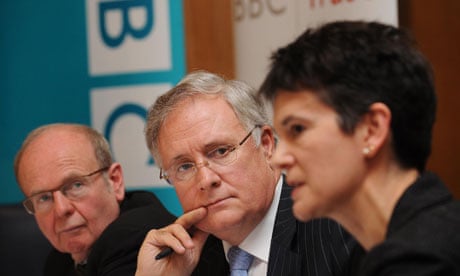When Lord Patten went before the Commons culture, media and sport select committee last month to lay out his credentials as the new chairman of the BBC Trust, he deliberately alighted on a key issue for programme makers and viewers: whether the BBC has become too risk-averse in its commissioning.
Patten volunteered his opinion that there were concerns that the BBC's editorial policy controls were inhibiting programme makers from taking risks. As chairman it was a subject he intended to look at. The compliance culture needed to ensure the best programme makers are not "bound by a rather labyrinthine bureaucracy", he said, a view which caused an immediate stir at the BBC.
The central issue is whether a succession of blunders and scandals – including the Iraq dossier row and ensuing Hutton inquiry, faked competitions, "Queengate" and the broadcast of the Jonathan Ross/Russell Brand lewd voicemail messages – has resulted in an overly heavy-handed response, through stricter editorial policy guidelines and an expanded 19-strong editorial policy unit of advisers, who some critics see as the equivalent of political commissars. A recent report by the International Broadcasting Trust found, after interviewing 25 producers anonymously, that "concern about risk aversion within the BBC was shared by the majority of those interviewed".
However, while independent producers privately express their belief that the BBC editorial policy department represents an unnecessary layer of bureaucracy interfering with the relationship between editor and programme maker, very few have been prepared to talk openly, as evidenced by the IBT report.
But this has just changed. The Lords communications committee's inquiry into the role of the BBC Trust and the governance of the corporation has identified the compliance regime as a concern.
Written and personal evidence is being provided to the committee by three senior figures, all with a BBC background: David Henshaw of Hard Cash Productions, who made Channel 4's Undercover Mosque, and Tom Roberts, of October Films, have pleaded for change. A further contribution, in writing, was made by Fiona Stourton, a former BBC executive producer of current affairs now at Ten Alps, owner of respected factual specialists Blakeway, Brook Lapping and Films of Record.
Stourton wrote: "What seems to have happened is a tipping moment, [the] editorial policy unit was there to advise, now it is unclear whether it is advice or instruction, so it's not clear where ultimate editorial power lies." Roberts, in verbal evidence, said that to describe the BBC as risk averse was an "understatement". "It has grown and grown, editorial policy used to be one person, a wise man or woman you went to for advice. Now it's a large organisation, political commissars, who sit in on sessions."
Henshaw argued: "It is a false response, and has led to an enormous bureaucracy."
Independents, including Henshaw and Roberts, say the BBC should move towards the simpler Channel 4 system, where responsibility for a show's compliance is shared between the commissioning editor and an in-house lawyer.
But is there any evidence the BBC will or should listen? Even if its new chairman demands changes? BBC executives will very soon be given the opportunity to defend the editorial policy regime before the Lords committee, which includes ITV veterans Melvyn Bragg and Gus Macdonald. Mark Thompson, the BBC director general, is up before the committee on Tuesday ; followed by head of editorial policy David Jordan and George Entwistle, acting director of BBC Vision, next week.
Helen Boaden, director of BBC News and, like Entwistle, a potential candidate to be the next director general, told a Voice of the Viewer & Listener conference earlier this month that she was a "pretty staunch defender" of the editorial policy unit, which often helped "get an idea on air, and they do stop some very stupid things". "It is very important that programme makers do feel a sense of responsibility and are not cavalier about it," Boaden said. "It's a great privilege broadcasting to the public, and we have to take it very responsibly."
Before the communications committee earlier this month, BBC trustee David Liddiment gave little outward sign of sharing Patten's concern. He said previous editorial failings had occurred because existing rules were breached. "So it is not surprising that the BBC may respond in what some might argue was a draconian way, tightened up compliance significantly," he added. "That has triggered something of a backlash from programme makers who feel these things are overdone. That is human nature, is it not?"
With Patten officially taking up his BBC job next week, this debate is going to run on for a while yet.
